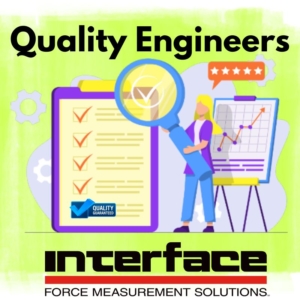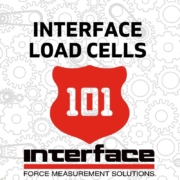Quality Engineers Require Accurate Force Measurement Solutions
 In engineering and manufacturing, when introducing a product onto the market the requirements and regulations can be immense. Each industry has strict guidelines to ensure safety, durability, quality, and overall customer satisfaction. To meet these requirements, most product and component maker will have experienced quality engineers to help meet the necessary requirements in production.
In engineering and manufacturing, when introducing a product onto the market the requirements and regulations can be immense. Each industry has strict guidelines to ensure safety, durability, quality, and overall customer satisfaction. To meet these requirements, most product and component maker will have experienced quality engineers to help meet the necessary requirements in production.
Quality Engineers work in a variety of industries including automotive, transportation, infrastructure, aerospace and defense, industrial automation, medical and healthcare devices, and consumer product manufacturing. Their role is to monitor, test, and report on the quality. They are also instrumental in strategy, process development, and increasing output. Depending on the position, they are responsible for inspecting and testing raw materials, components, mechanical systems, hardware and software, as well as final products.
The Quality Engineer works with manufacturers, developers, project managers. Commonly, they are aligned with quality assurance and quality control teams to develop processes, test procedures and implement systems that ensure manufactured products and fabrication processes meet quality standards, safety regulations, and satisfy all stakeholders. They are the safeguard for companies that are creating, building and distributing products and materials.
Accuracy of testing and measurement data is fundamental to quality engineers. Critical to quality assurance and control processes, quality engineers rely heavily on all types of Interface high-accuracy load cells, weighing systems, and instrumentation for force measurement quality systems. Manufacturing quality engineers rely on products from Interface to test both products and equipment on a manufacturing line to ensure they perform reliably and meet certain safety standards.
Force measurement systems also make role of a quality engineer easier through the use of accurate data. This is because force measurement often enables automated, real-time monitoring of many processes used in the making of things. Interface precision load cells are used to monitor assembly line machine processes, test and monitor automation equipment like robotics, and weighcheck systems, and ruggedized equipment for quality control onsite and in remote locations.
Included below are a few examples of how force measurement systems are used in quality engineering.
Medical Device Interventional Guidewire Quality Inspection
A medical device manufacturer needs to do quality checks on threaded ends of their interventional guidewire devices. The threaded end of the guidewire contains an extremely small 000-120 thread that needs to be tested with go and no-go gauges in order to see if it will mate with other critical subassemblies. They requested a custom made turnkey test stand that is both inexpensive and flexible for varying lengths and models of guidewires. Interface suggests a system where the customer can axially load and insert the guidewire through the MRT Miniature Flange Style Reaction Torque Transducer, secure it, and use an automated stepper motor on a slide base to test the thread quality. When in use, the MRT measures the torque magnitudes of both no-go and go gauges which indicate quality of the threaded guidewire.
Snack Weighing and Packaging Machine Quality Monitoring
One aspect of quality in the consumer packaged goods space is ensuring equal distributions of individually wrapped snack bags such as chips or candy. When snack manufacturing brand wanted to weigh the amount of their snacks that is automatically dispersed into the bags during the packaging process, Interface offered a solution. We suggested multiple SPI Platform Scale Load Cells, and installed them to the potato multi-head weigher and packaging machine. The SPI Platform Scale Load cells were installed inside of the mount that attaches the head weigher to the packaging machine. Force results from the potato chips were read by the load cells and sent to the ISG Isolated DIN Rail Mount Signal Conditioner, where the customer is able to control the automated production from their command center. The customer was able to determine the weight of the potato chips being distributed into their bags with highly accurate results. They also were able to control the automated production process with the provided instrumentation. They will use this same weighing method for other snacks that need to be packaged utilizing this machine.
Vehicle Crash Test Load Cell Wall Quality Inspection
A facility wanted to do crash tests on their vehicles for quality inspection. There are multiple tests such as structural testing of the vehicle, developmental tests, and regulatory and compliance tests and they needed to measure the force of the vehicle crash tests, on all axes. Interface’ suggested using multiple 3A400 3-Axis Force Load Cells, and attach it to the back of a cement crash wall. When connected to the BX8-HD44 Interface BlueDAQ Series Data Acquisition System, force result measurements will be recorded and displayed with the customer’s PC or laptop. The customer was able to measure the force of impact for all of their different vehicle crash testing demonstrations.
The applications of force measurements for quality engineers are large, and the necessity of obtaining this data is critical to creating, safe, reliable and high-quality products.
ADDITIONAL RESOURCES
Interface Solutions for Material Testing Engineers
Why Civil Engineers Prefer Interface Products
Why Product Design Engineers Choose Interface
The Five Critical Factors of Load Cell Quality








